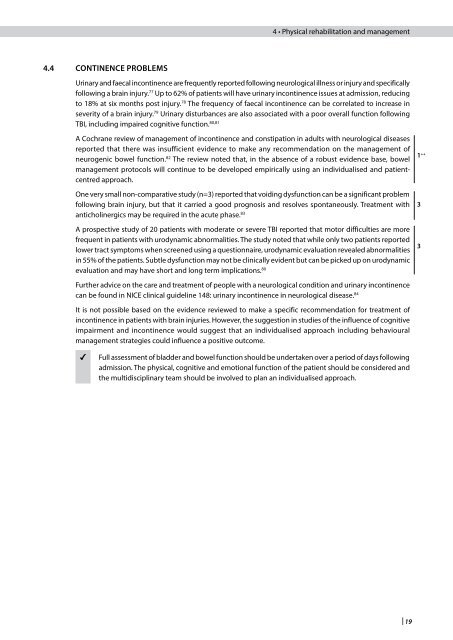sign130
sign130
sign130
Create successful ePaper yourself
Turn your PDF publications into a flip-book with our unique Google optimized e-Paper software.
4.4 CoNTINENCE PRoBlEMS<br />
4 • Physical rehabilitation and management<br />
Urinary and faecal incontinence are frequently reported following neurological illness or injury and specifically<br />
following a brain injury. 77 Up to 62% of patients will have urinary incontinence issues at admission, reducing<br />
to 18% at six months post injury. 78 The frequency of faecal incontinence can be correlated to increase in<br />
severity of a brain injury. 79 Urinary disturbances are also associated with a poor overall function following<br />
TBI, including impaired cognitive function. 80,81<br />
A Cochrane review of management of incontinence and constipation in adults with neurological diseases<br />
reported that there was insufficient evidence to make any recommendation on the management of<br />
neurogenic bowel function. 82 The review noted that, in the absence of a robust evidence base, bowel<br />
management protocols will continue to be developed empirically using an individualised and patientcentred<br />
approach.<br />
One very small non-comparative study (n=3) reported that voiding dysfunction can be a significant problem<br />
following brain injury, but that it carried a good prognosis and resolves spontaneously. Treatment with<br />
anticholinergics may be required in the acute phase. 83<br />
A prospective study of 20 patients with moderate or severe TBI reported that motor difficulties are more<br />
frequent in patients with urodynamic abnormalities. The study noted that while only two patients reported<br />
lower tract symptoms when screened using a questionnaire, urodynamic evaluation revealed abnormalities<br />
in 55% of the patients. Subtle dysfunction may not be clinically evident but can be picked up on urodynamic<br />
evaluation and may have short and long term implications. 80<br />
Further advice on the care and treatment of people with a neurological condition and urinary incontinence<br />
can be found in NICE clinical guideline 148: urinary incontinence in neurological disease. 84<br />
It is not possible based on the evidence reviewed to make a specific recommendation for treatment of<br />
incontinence in patients with brain injuries. However, the suggestion in studies of the influence of cognitive<br />
impairment and incontinence would suggest that an individualised approach including behavioural<br />
management strategies could influence a positive outcome.<br />
Full assessment of bladder and bowel function should be undertaken over a period of days following<br />
admission. The physical, cognitive and emotional function of the patient should be considered and<br />
the multidisciplinary team should be involved to plan an individualised approach.<br />
| 19<br />
1 ++<br />
3<br />
3


